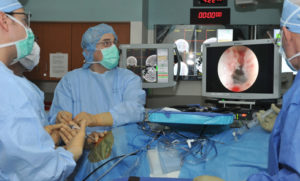A career in neurosurgery is a rigorous undertaking, and thoughtful deliberation is required before a student commits to applying. Exposure to the field and close mentorship are critical in determining whether neurosurgery is a good fit for a given applicant. We recommend that all possible applicants seek out multiple mentors early in medical school, to cover their full swath of clinical, educational, and academic needs. Although requesting mentorship may feel intimidating, most neurosurgeons are very supportive of education, and would welcome outreach from an interested student. Avenue that may warrant exploration include:
- Home Institution: For students with a Neurosurgery Department and/or Residency Program at their home institution, this is the best place to start. Reach out to one of the neurosurgeons or program coordinator and express your interest in the applying to neurosurgery. Get to know neurosurgeons in active practice, and spend time with them and with residents training in neurosurgery. There are many different styles of practice, and a wide variety of personalities can be found in neurosurgery. To be certain that this career is right for you, it is wise to immerse yourself for a period of time. Spend several months on the neurosurgery service. Go to the operating room and clinic as much as possible. Shadow a neurosurgeon to see what his or her life is like. Consider spending time in a neurosurgery laboratory to understand the complexity and beauty of neuroscience and research.
 Outside Institutions: Regardless of whether you have a Neurosurgery program at your home institution, experiencing neurosurgery somewhere else is always beneficial. Spend some time at a neurosurgery program other than the one at your own institution. Talk to neurosurgery residents about their experiences with the interview process and how they ranked programs. Ask questions.
Outside Institutions: Regardless of whether you have a Neurosurgery program at your home institution, experiencing neurosurgery somewhere else is always beneficial. Spend some time at a neurosurgery program other than the one at your own institution. Talk to neurosurgery residents about their experiences with the interview process and how they ranked programs. Ask questions.- Directed Mentorship: By the middle of your M3 year, you should have a mentor who will help guide you through the match process. This person is often the Program Director, Chair, Associate Program Director, or Medical Student Director for your home department, but could be any neurosurgeon who is available, experienced as a mentor, and open to advising you. Make sure the surgeon you select is intimately involved in the resident selection process, as they are most likely to give good advice. Your mentor can help judge the strength of your application and suggest what programs you should select for visiting rotations and, eventually, applications. It is especially important to have a strong, reliable, and honest mentor if you think your application is not very strong —candid feedback will help you determine whether additional resources such as a research year, or a back-up plan may be needed in your situation. For all applicants, mentors also provide the critical role of reaching out to your top ranked programs to advocate on your behalf as rank lists are finalized
There are many resources for mentorship and involvement in organized neurosurgery.
Consider becoming part of an AANS Medical Student Chapter.